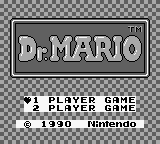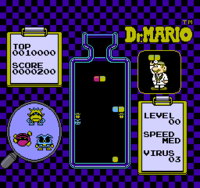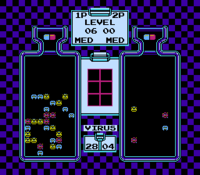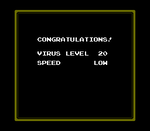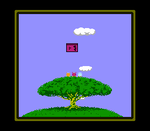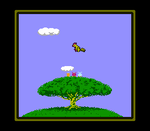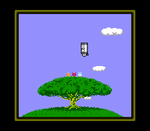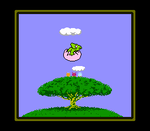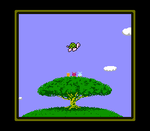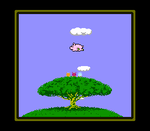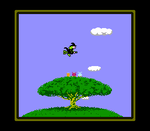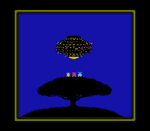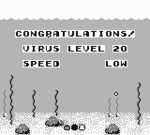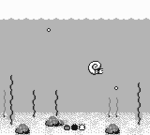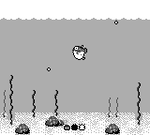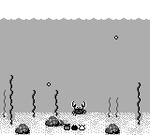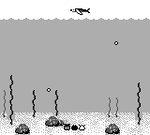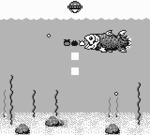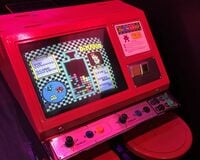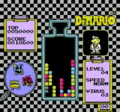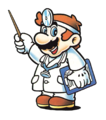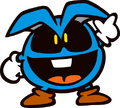Dr. Mario (game)
- This article is about the game. For Mario's doctor persona, see Dr. Mario. For other uses, see Dr. Mario (disambiguation).
| Dr. Mario | |||||||||||||||
|---|---|---|---|---|---|---|---|---|---|---|---|---|---|---|---|
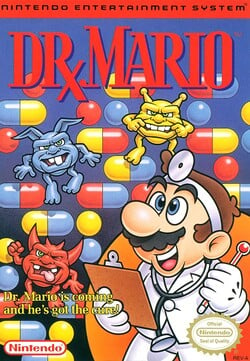 NES box art 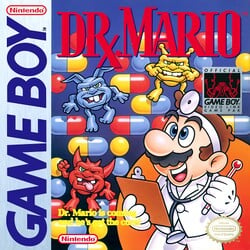 Game Boy box art For alternate box art, see the game's gallery. | |||||||||||||||
| Developer | Nintendo R&D 1 | ||||||||||||||
| Publisher | Nintendo | ||||||||||||||
| Platform(s) | Family Computer/Nintendo Entertainment System, Game Boy, PlayChoice-10, VS. System, Game Boy Advance, Satellaview, Super Famicom/Super Nintendo Entertainment System, Virtual Console (Nintendo 3DS, Wii U), NES Classic Edition/Nintendo Classic Mini: Family Computer, Nintendo Entertainment System - Nintendo Switch Online, Game Boy - Nintendo Switch Online | ||||||||||||||
| Release date | Famicom:
NES:
VS. System: Nintendo PlayChoice-10: Game Boy: LodgeNet (Super NES version): Satellaview: Player's Choice (Game Boy Version): Super Famicom (NP): Game Boy (NP): Game Boy Advance (NES version): Virtual Console (3DS) (Game Boy version): Virtual Console (Wii U) (NES version): NES Classic Edition/Famicom Mini: Nintendo Entertainment System - Nintendo Switch Online: The UFO cover-up. (NES version): Game Boy - Nintendo Switch Online: | ||||||||||||||
| Language(s) | English | ||||||||||||||
| Genre | Puzzle | ||||||||||||||
| Rating(s) |
| ||||||||||||||
| Mode(s) | 1–2 players | ||||||||||||||
| Format | Arcade:
Built-in Famicom:
NES:
Super NES: Wii U: Nintendo Switch: Game Boy:
Game Boy Advance: Nintendo 3DS: NES Classic Edition:
Built-in
| ||||||||||||||
| Input | Famicom:
NES:
Wii U: Nintendo Switch: Game Boy:
Game Boy Advance: Nintendo 3DS: NES Classic Edition:
| ||||||||||||||
| Serial code(s) | Famicom: Game Boy: DMG-VUA Game Boy Advance: | ||||||||||||||
Dr. Mario (stylized as D℞. MARIO on the Western logo) is an arcade-style puzzle video game created by Nintendo, and it was released for the Nintendo Entertainment System and Game Boy in 1990. The gameplay is very similar to that of Tetris, although in Dr. Mario, the object is to line up vitamins to destroy viruses.
Story
The following text is taken directly from the instruction manual.
Hi everybody! I'm Mario. How's it going? Over the last few years, I've been involved in some pretty wild adventures. Now, believe it or not, I work in the virus research lab at the Mushroom Kingdom Hospital. Today I'm about to begin my research as usual.
"Dr. Mario, something terrible has happened!"
"What's wrong, nurse Toadstool?" "One of the experiments has gone out of control. The viruses are spreading quickly!"
"Oh No! We've got to do something! I have just developed a new vitamin that should be able to take care of it. I sure hope this stuff works!"
Dr. Mario works in a virus research lab at the Mushroom Kingdom Hospital, alongside Nurse Toadstool. When one of the experiments goes wrong, the hospital is flooded with tri-color viruses. Armed with vitamin capsules–a medicine of his own invention–Dr. Mario sets out to neutralize the outbreak.
Gameplay
A giant bottle with a grid at 8 tiles long and 16 tiles tall is the interface. When a stage is begun, viruses populate the bottle in three varieties: Chill (blue), Fever (red), and Weird (yellow). The player uses vitamin capsules that are either red, blue, or yellow, sometimes only on one side. Putting at least four like-colored objects together eliminates them, therefore including viruses. However, if the vitamin capsules stack over the bottle, it is a Game Over. The interface also features a magnifying glass where the three varieties of viruses move around. Whenever at least one virus is eliminated, the identically colored one under the magnifying glass falls over briefly, as well as disappears if none of its type is left. After several vitamins are dropped, a five-note chime plays, indicating that gameplay has sped up.
1-Player Game
The mode opens with three options. The first option is Virus Level, ranging from 0 to 20, and the number of viruses is determined by the formula: [level number] x 4 + 4. The Family Computer and NES version can go up to level 24, but levels 20 and higher always include 84 viruses.[12] Level 28 is a kill screen in which Mario does not appear.[citation needed] The second option is Speed, which determines whether vitamins fall at Low, Med (medium), or Hi (high) speed. The third and final option is Music Type, where the player can choose between Fever, Chill, or Off (no music); the Game Boy version plays the music when highlighting the option.
In gameplay, the score is tracked, and the score can only be added to by eliminating viruses. The base score for defeating viruses is 100 for Low, 200 for Med, and 300 for Hi, and more points are earned from defeating more viruses in a row. After completing a level, by defeating every virus, the score is retained in the next level. The basic scoring is as follows:
| Virus # | Low | Med | Hi |
|---|---|---|---|
| 1 | 100 | 200 | 300 |
| 2 | 200 | 400 | 600 |
| 3 | 400 | 800 | 1200 |
| 4 | 800 | 1600 | 2400 |
| 5 | 1600 | 3200 | 4800 |
| 6+ | 3200 | 6400 | 9600 |
In the Game Boy version only, a fanfare plays depending on how many lines were made and a different one for clearing at least four lines in a single move.
2-Player Game
The mode requires the use of a Game Link Cable and is not playable in the Virtual Console release. Each player either tries to clear their grid first or have their opponent get a Game Over. Each player picks their own Level and Speed option. During a head-on-head game, getting rid of more than one line from a single vitamin capsule drops an equivalent number on the opponent's side. Two pieces always drop four columns apart, while three pieces are always two apart. The first player to win three rounds wins.
Controls
/
: Move cursor on the menu screen
/
(left/right): Move vitamin capsule
/
(down): Drop vitamin capsule
/
: Rotate vitamin capsule clockwise
/
: Rotate vitamin capsule counterclockwise
/
: Start the game; Pause or unpause game during gameplay,
/
: Move cursor on the title screen
Characters
Cutscenes
A short cutscene plays depending on the level and speed cleared, featuring a message with "CONGRATULATIONS!" and the Virus Level and Speed cleared. If something moves in the cutscene, they appear before the cutscene plays in the Family Computer/NES version but afterward in the Game Boy version.
Family Commputer/NES
The viruses are in a tree at the start of most cutscenes. There are unused graphics of a snowman and a round ball, likely intended for the cutscenes.[13]
Game Boy
The viruses are at the sea floor at the start of every cutscene.
Reception
The Game Boy version of the game was placed 45th in the 100th issue of Nintendo Power's "100 best Nintendo games of all time" in 1997.[14] The NES version placed 69th in the 200th Issue of GameInformer's "Top 200 Games of All Times". The game placed 51st in IGN's Top 100 NES Games list.[15]
Reviews for the game were generally positive, although there has been some criticism from parents about the medicine in a children's game. ACE in particular was more negative, giving the Game Boy version 510/1000, criticizing the repetitive gameplay and uninspired graphics. They also stated that the game "reeks of plagarism", stating that it was worse than the original games it was modeled after.[16] GameRankings gave the game 69.25%, while review aggregator Metacritic gave it a 66 out of 100 based on 10 reviews.
Remakes and ports
VS. Dr. Mario
The game was released on the VS. System under the name VS. Dr. Mario. This version was first shown at Nintendo's Seventh Annual Distributor Meeting in San Diego, and was released simultaneously with the PlayChoice-10 version in August 1990.[3] Players can spend only 20 seconds on the settings menu. This version drops the Low speed and renames the Med speed to Norm (normal). Normal speed has a grey background while High is now purple. There is no option to turn off the music.
The scoring system is also less generous. In the NES version, the first virus killed by a vitamin capsule yields 200 points (on Medium speed), the second 400, the third 800, the fourth 1600, so each virus is worth twice as much as the last. In the VS. version, the first virus is worth 200, then 400, then 600, then 800, so a virus is worth only 200 points more, and not twice as many points, as the previous virus.
Satellaview
A slightly altered version of Dr. Mario known as Dr. Mario BS Ban「Dr.マリオBS版」was broadcast for the Satellaview system between March 1997 and June 2000.[17] It has the same graphics and music that was used in the remake from Tetris & Dr. Mario which was not released in Japan. The complete game is in the ROM, just locked out.[18]
List of re-releases and ports
- 1990: Dr. Mario was made available for the VS. System and Nintendo PlayChoice-10 arcade machines in North America.
- 1994: Nintendo released the remake for SNES, as a part of the Tetris & Dr. Mario cartridge.
- 2003: The original Famicom version is ported to Game Boy Advance through Nintendo Puzzle Collection, where that version requires a Game Boy Advance.
- 2004: Nintendo re-released the original NES version for the Game Boy Advance, as part of the Classic NES Series.
- 2005: Nintendo again released Dr. Mario for Game Boy Advance, but this time as an enhanced remake in Dr. Mario & Puzzle League.
- 2012: On March 22, 2012, the Game Boy version was released on the Nintendo 3DS's Virtual Console in PAL regions and it was released in Japan and North America on October 2nd and 3rd respectively later that year.
- 2014:
- Dr. Mario is one of the games that appear in NES Remix 2 and Ultimate NES Remix. It is the final challenge in Championship Mode.
- A trial version of the Game Boy game appears as an unlockable Masterpiece in Super Smash Bros. for Wii U.
- 2015: A trial version of the NES game appears as a "highlight" in amiibo tap: Nintendo's Greatest Bits.
- 2016:The NES and Famicom version of Dr. Mario is one of the 30 games included in the NES Classic Edition and Nintendo Classic Mini: Family Computer, respectively.
- 2018: The NES version of Dr. Mario was made available as one of the 20 NES titles at Nintendo Entertainment System - Nintendo Switch Online's launch in September 2018, and can be played competitively with other players online.[19] A special edition titled Dr. Mario: The UFO cover-up. that starts the player at level 20 and Hi speed was also added on December 12, 2018.
- 2024: The Game Boy version of Dr. Mario was made available for Game Boy - Nintendo Switch Online on March 11, 2024 in the Americas and March 12 elsewhere, alongside the Game Boy Color versions of Mario Tennis and Mario Golf.
Microgames
WarioWare, Inc.: Mega Microgame$! featured a microgame version of Dr. Mario. There is also an unlockable mini game version entitled Dr. Wario.
Another microgame based on this game appeared in WarioWare Gold, with twist controls instead of Mega Microgames$!'s button controls.
Another microgame based on this game appeared in WarioWare: Move It!
Development
Dr. Mario was originally under the title "Virus", which had similar gameplay, but the goal was to cure viruses in a sick animal. What appears to be Nurse Toadstool is also visible in the game.[20]
Gallery
- For this subject's image gallery, see Gallery:Dr. Mario (game).
Media
- For a complete list of media for this subject, see List of Dr. Mario media.
| File info 0:30 |
| File info 0:30 |
| File info 0:30 |
| File info 0:30 |
| File info 0:30 |
| File info 0:30 |
| File info 0:30 |
Staff
- Main article: List of Dr. Mario staff
Names in other languages
| Language | Name | Meaning | Notes |
|---|---|---|---|
| Japanese | ドクターマリオ[?] Dokutā Mario |
Dr. MARIO | |
| Chinese (simplified) | 马力欧医生[?] Mǎlì'ōu Yīshēng |
Dr. Mario | |
| Chinese (traditional) | 瑪利歐醫生[?] Mǎlì'ōu Yīshēng |
Dr. Mario |
Dr. Mario: The UFO cover-up.
| Language | Name | Meaning | Notes |
|---|---|---|---|
| Japanese | ドクターマリオ 知る人ぞ知るUFO直前バージョン[?] Dokutā Mario Shiru Hitozo Shiru Yūfō Chokuzen Bājon |
Dr. MARIO: "Just Before the UFO Known to the Few" Version | |
| French | Dr. Mario: Conspiration extraterrestre[?] | Dr. Mario: Extraterrestrial conspiracy |
Footnotes
- ^ Exact date unknown due to no known information. Earliest known document (as of July 10, 2024) about it is from August 29, 1999 (https://snescentral.com/1/0/1/1019/pdf/drmario.pdf). No similar documents for any game was dated earlier than August 1999, at which point LodgeNet installations for Nintendo 64 was in process. The LodgeNet-exclusive Noughts & Crosses had a copyright year of 1998, but the overall Gateway System launched in 1993.
References
- ^ ドクターマリオ. Nintendo Japan (Japanese). Retrieved August 13, 2024.
- ^ Sakai, Kazuya, kikai, Rachel Roberts, and Jenny Blenk, editors (2019). The Art of Super Mario Odyssey (First English Edition). Milwaukie: Dark Horse Books. ISBN 978-1-50671-375-5. Page 360.
- ^ a b c "Nintendo Bows VS. Dr. Mario Pak At San Diego Distributor Meeting" (RePlay Magazine Vol. 16 No. 1, August 1990)
- ^ Dr. MARIO. Nintendo Japan (Japanese). Retrieved August 13, 2024.
- ^ Super Smash Bros. for Wii U Masterpieces
- ^ Nintendo E3 1997 Press Kit. Nintendo of America (English). Retrieved November 10, 2024.
- ^ Dr. Mario (NP). The Mushroom Kingdom. Retrieved June 1, 2024.[better source needed]
- ^ ファミコンミニ/ドクターマリオ. Nintendo Co., Ltd. (Japanese). Retrieved January 16, 2025.
- ^ Super Smash Bros. Brawl Chronicle
- ^ Dr. Mario | Game Boy Advance | Games | Nintendo UK. Nintendo UK (British English). Retrieved January 16, 2025.
- ^ @NintendoAmerica (March 11, 2024). "Oh yeah! Three classic games featuring Mario are now live for #NintendoSwitchOnline members! #GameBoy: ☑️ Dr. Mario Game Boy Color: ☑️ Mario Tennis ☑️ Mario Golf". X (American English). Retrieved July 4, 2024.
- ^ Michael Birken (June 24, 2017). Dr. Mario AI Defeats Level 24 and Beyond. YouTube. Retrieved June 1, 2024.
- ^ Dr. Mario § Unused Sprites. The Cutting Room Floor (English). Retrieved June 1, 2024.
- ^ Nintendo Power Volume 100. Page 94..[page number needed]
- ^ 51: Dr. Mario. IGN. Retrieved June 1, 2024.
- ^ [1]
- ^ まさと (May 17, 2023). ドクターマリオBS版 VS.COMをプレイしてみた. YouTube (Japanese). Retrieved June 1, 2024.
- ^ Tetris & Dr. Mario § BS and NP Dr. Mario. The Cutting Room Floor (English). Retrieved June 1, 2024.
- ^ Nintendo Entertainment System – Nintendo Switch Online. Nintendo of America. Retrieved June 1, 2024.
- ^ VGArtAndTidbits. A look at the prototype for Dr. Mario. During development it was called "Virus" and displayed a window of a sick animal you had to cure.. X. Retrieved June 1, 2024.
External links
- Nintendo UK Game Boy Advance site
- Japanese website (Game Boy)
- Japanese website (Super Famicom Nintendo Power)
- Japanese website (Famicom 40th Anniversary)
- Japanese Famicom manual
- North American NES manual
| Game Boy games | |
|---|---|
| Super Mario franchise | Alleyway (1989) • Baseball (1989) • Super Mario Land (1989) • Golf (1989) • Dr. Mario (1990) • Super Mario Land 2: 6 Golden Coins (1992) • Donkey Kong (1994) • Mario's Picross (1995) • Picross 2 (1996) |
| Donkey Kong franchise | Donkey Kong (1994) • Donkey Kong Land (1995) • Donkey Kong Land 2 (1996) • Donkey Kong Land III (1997) |
| Yoshi franchise | Yoshi (1991) • Yoshi's Cookie (1992) • Tetris Attack (1996) |
| Wario franchise | Wario Land: Super Mario Land 3 (1994) • Wario Blast: Featuring Bomberman! (1994) • Wario Land II (1998) |
| Miscellaneous | Tetris (1989) • The Legend of Zelda: Link's Awakening (1993) • Game & Watch Gallery (1997) • Game & Watch Gallery 2 (1997) • Game Boy Camera (1998) |
